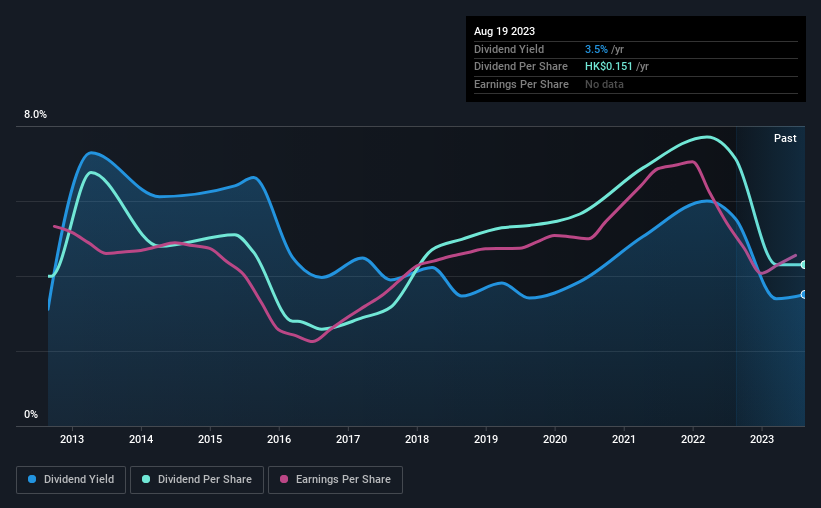Tenfu (Cayman) Holdings' (HKG:6868) Shareholders Will Receive A Bigger Dividend Than Last Year

Tenfu (Cayman) Holdings Company Limited's (HKG:6868) dividend will be increasing from last year's payment of the same period to CN¥0.05 on 27th of September. Despite this raise, the dividend yield of 3.5% is only a modest boost to shareholder returns.
View our latest analysis for Tenfu (Cayman) Holdings
Tenfu (Cayman) Holdings' Dividend Is Well Covered By Earnings
While yield is important, another factor to consider about a company's dividend is whether the current payout levels are feasible. Before this announcement, Tenfu (Cayman) Holdings was paying out 72% of earnings, but a comparatively small 50% of free cash flows. In general, cash flows are more important than earnings, so we are comfortable that the dividend will be sustainable going forward, especially with so much cash left over for reinvestment.
Over the next year, EPS could expand by 0.06% if the company continues along the path it has been on recently. If recent patterns in the dividend continue, the payout ratio in 12 months could be 88% which is a bit high but can definitely be sustainable.

Dividend Volatility
Although the company has a long dividend history, it has been cut at least once in the last 10 years. Since 2013, the annual payment back then was CN¥0.13, compared to the most recent full-year payment of CN¥0.14. Dividend payments have grown at less than 1% a year over this period. It's encouraging to see some dividend growth, but the dividend has been cut at least once, and the size of the cut would eliminate most of the growth anyway, which makes this less attractive as an income investment.
The Dividend's Growth Prospects Are Limited
Given that the dividend has been cut in the past, we need to check if earnings are growing and if that might lead to stronger dividends in the future. Tenfu (Cayman) Holdings hasn't seen much change in its earnings per share over the last five years. Slow growth and a high payout ratio could mean that Tenfu (Cayman) Holdings has maxed out the amount that it has been able to pay to shareholders. When a company prefers to pay out cash to its shareholders instead of reinvesting it, this can often say a lot about that company's dividend prospects.
In Summary
In summary, it's great to see that the company can raise the dividend and keep it in a sustainable range. While the payout ratios are a good sign, we are less enthusiastic about the company's dividend record. The payment isn't stellar, but it could make a decent addition to a dividend portfolio.
Investors generally tend to favour companies with a consistent, stable dividend policy as opposed to those operating an irregular one. At the same time, there are other factors our readers should be conscious of before pouring capital into a stock. To that end, Tenfu (Cayman) Holdings has 2 warning signs (and 1 which can't be ignored) we think you should know about. Is Tenfu (Cayman) Holdings not quite the opportunity you were looking for? Why not check out our selection of top dividend stocks.
Valuation is complex, but we're here to simplify it.
Discover if Tenfu (Cayman) Holdings might be undervalued or overvalued with our detailed analysis, featuring fair value estimates, potential risks, dividends, insider trades, and its financial condition.
Access Free AnalysisHave feedback on this article? Concerned about the content? Get in touch with us directly. Alternatively, email editorial-team (at) simplywallst.com.
This article by Simply Wall St is general in nature. We provide commentary based on historical data and analyst forecasts only using an unbiased methodology and our articles are not intended to be financial advice. It does not constitute a recommendation to buy or sell any stock, and does not take account of your objectives, or your financial situation. We aim to bring you long-term focused analysis driven by fundamental data. Note that our analysis may not factor in the latest price-sensitive company announcements or qualitative material. Simply Wall St has no position in any stocks mentioned.
About SEHK:6868
Tenfu (Cayman) Holdings
Operates as a traditional Chinese tea-product company.
Excellent balance sheet second-rate dividend payer.
Market Insights
Community Narratives



